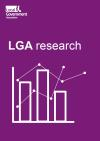From July 2023 to September 2023 the Local Government Association conducted a survey of local authorities to identify the impact that is likely to result from the UK’s mobile network operators’ confirmation to the Government that they do not intend to offer 2G and 3G mobile networks past 2033 at the latest.
A total of 47 responses were received which covered the views of 53 councils (some respondents provided the same response for multiple councils).
Key Findings
- Awareness: Around two-fifths (38 per cent) of respondents said they were fully aware of the upcoming switch off of the UK’s 2G and 3G mobile networks.
- Awareness: A quarter (27 per cent) of respondents said they were partially aware of the upcoming switch off of the UK’s 2G and 3G mobile networks whilst seven per cent of respondents said they were not aware at all.
- Senior/Executive Management Team: Half of the respondents (48 per cent) said their Senior/Executive Management Teams were partially aware of the upcoming switch off of the UK’s 2G and 3G mobile networks whilst 14 per cent were not at all aware.
- Elected Members: Almost half of the respondents (45 per cent) said their Elected Members were partially aware of the upcoming switch off of the UK’s 2G and 3G mobile networks whilst two-fifths (39 per cent) said they were not at all aware.
- Operational Staff: Two-fifths of respondents (42 per cent) said their Operational Staff were partially aware whilst a further thirteen per cent said they were not at all aware.
- Reliance: Almost two-thirds of respondents (63 per cent) said their authority was still using devices and systems that were reliant on 2G and 3G networks to at least a small extent.
- Confidence: Around a third of respondents (32 per cent) said they feel very confident about their authority’s ability to manage the switch off of 2G and 3G networks with minimal impact on its operations and services. Two-fifths of respondents (38 per cent) said they were fairly confident whilst a fifth (18 per cent) said they were not very confident.
- Costs: Under a fifth of respondents (17 per cent) said their council had incurred costs already in switching from 2G and 3G in the last six months whilst three fifths (60 per cent) said they had not yet incurred costs.
- Costs: Around a quarter of respondents (23 per cent) said they were confident that no additional costs would be incurred by the transition from 2G and 3G networks. A tenth of respondents (nine per cent) said they believed that there would be costs incurred by the switch off but that they had accurately estimated those costs and secured funding to cover all of them.
- Costs: A further nine per cent of respondents said they believed there would be costs incurred by the switch off and that they have accurately estimated them, but have not yet secured funding to cover them. Around a third (29 per cent) said they believed there will be costs incurred by the switch off, but they have not yet accurately estimated how much they are likely to be. A quarter of respondents (23 per cent) said they didn’t yet know if there would be costs incurred by the switch off.
- Support: A fifth of respondents (19 per cent) said they would value support from the LGA in managing the 2G and 3G switch-off to a great extent. Around a third of respondents (31 per cent) said to a moderate extent whilst a further 19 per cent said to a small extent. A quarter of respondents (25 per cent) said not at all.
- Support: Almost three-quarters of respondents (72 per cent) said they would value online resources from the LGA. Around two-fifths of respondents (41 per cent) said they would like events and webinars with a further 41 per cent choosing policy and campaigning.

- Published by:
-
LGA
- Reference code:
